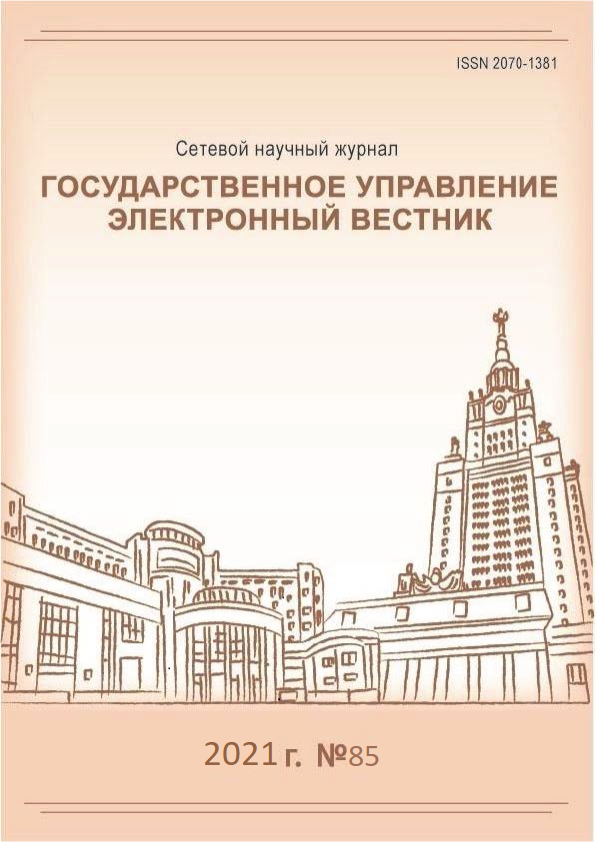Possibilities of Applying Methodology of the New Institutional Economics to Improve Antitrust Regulation in the Context of Digital Transformation
Keywords:
Antitrust regulation, new institutional economics, network effects, bounded rationality, discrete structural alternativesAbstract
Digitalization brings significant changes to economic processes: new business models are emerging; the behavior of old companies is changing. The activities of digital companies are closely related to network effects, positive and negative. The internalization of network effects expands the capabilities of digital companies, allows them to influence the market situation, occupy a dominant position and establish barriers to market entry, which can lead to market monopolization. When conducting an economic analysis of the digital companies’ activities for the purposes of antitrust regulation, it is extremely important to take into account the role of network effects, otherwise the analysis results will contain errors. Thus, in the context of digital transformation, it becomes necessary to adapt antitrust regulation systems to new realities. The article is devoted to the disclosure of the possibilities of applying the methodological approaches of the new institutional economics to improve antitrust regulation in the context of digitalization. Among these approaches, special attention should be paid to the theory of externalities, the concept of bounded rationality, and the method of discrete structural alternatives. The analysis showed that the use of the theory of externalities developed within the framework of the new institutionalism makes it possible to choose the most effective method of internalizing network effects for each specific case. The application of the bounded rationality concept in antitrust regulation allows ex ante detection of abuses by digital giants based on the use of big data and user behavior. On the grounds of the use of the discrete structural alternatives method, the antimonopoly authorities can choose both the most effective tools for theoretical analysis and make the most effective decisions in practice, which is especially important given the fact that the decisions made create rules of conduct for market participants.
References
Асадуллина А.В. Конкуренция между владельцами цифровых платформ в мировой экономике // Российский внешнеэкономический вестник. 2020. № 1. С. 51–59.
Егорова М.А., Хохлов Е.С. Современные проблемы анализа товарных рынков для целей антимонопольного регулирования // Актуальные проблемы российского права. 2021. № 1. С. 111–119. DOI: https://doi.org/10.17803/1994-1471.2021.122.1.111-119.
Попондопуло В.Ф., Петров Д.А., Силина Е.В. Проблемы правовой защиты экономической конкуренции в условиях цифровизации экономики // Конкурентное право. 2019. № 3. С. 7–11.
Рубцова Н.В. Антимонопольное регулирование как основное направление нормативного регулирования предпринимательской деятельности // Актуальные проблемы российского права. 2020. № 8. С. 126–135. DOI: https://doi.org/10.17803/1994-1471.2020.117.8.126-135.
Тархова К.В., Алифиров В.И., Горохова О.Н. Эволюция антимонопольного регулирования в России в цифровую эпоху // Цифровое право. 2020. № 4. С. 38–55. DOI: 10.38044/2686-9136-2020-1-4-38-55.
Тутов Л.А., Шаститко А.Е. Ограниченная рациональность: проблемы системности определения в междисциплинарном контексте // Общественные науки и современность. 2005. № 2. С. 117–127.
Тутов Л.А., Шаститко А.Е. Опыт предметной идентификации новой институциональной экономической теории // Вопросы философии. 2017. № 6. С. 63–73.
Фуруботн Э., Рихтер Р. Институты и экономическая теория. Достижения новой институциональной экономической теории. СПб.: Издательство СПбГУ, 2005.
Шаститко А.Е. Выбор дискретных институциональных альтернатив: что с чем сравниваем? // Общественные науки и современность. 2016. № 4. С. 134–145.
Шаститко А.Е. Новая институциональная экономическая теория: особенности предмета и метода. М.: ТЕИС, 2003.
Шаститко А.Е., Маркова О.А. Старый друг лучше новых двух? Подходы к исследованию рынков в условиях цифровой трансформации для применения антимонопольного законодательства // Вопросы экономики. 2020. № 6. С. 37–55. DOI: https://doi.org/10.32609/0042-8736-2020-6-37-55.
Шаститко А.Е., Паршина Е.Н. Рынки с двусторонними сетевыми эффектами: спецификация предметной области // Современная конкуренция. 2016. Т. 10. № 1. С. 5–18.
Bamberger K.A., Lobel O. Platform Market Power // Berkeley Technology Law Journal. 2017. Vol. 32. No. 3. P. 1051–1092. DOI: 10.15779/Z38N00ZT38.
Carvalho S. The US Antitrust Jurisprudence through the Lens of Chicago School and the Transaction Costs Economics // Tribuna Juridica. 2019. No. 9. P. 93–109.
Evans D.S., Schmalensee R. The Industrial Organization of Markets with Two-Sided Platforms // Platform Economics: Essays on Multi-Sided Businesses. 2011. P. 2–29.
Johnson P. Indirect Network Effects, Usage Externalities, and Platform Antitrust // Journal of Competition Law & Economics. 2019. Vol. 15. Is. 2-3. P. 283–297. DOI: https://doi.org/10.1093/joclec/nhz014.
Katz M. Multisided Platforms, Big Data, and a Little Antitrust Policy // Review of Industrial Organization. 2019a. No. 54. P. 695–716. DOI: 10.1007/s11151-019-09683-9.
Katz M. Platform Economics and Antitrust Enforcement: A Little Knowledge Is a Dangerous Thing // Journal of Economics and Management Strategy. 2019b. No. 1. P. 138–152. DOI: https://doi.org/10.1111/jems.12304.
Panhans M., Schumacher R. Perspectives on Antitrust of the American Institutionalist Economists // Comparative Political Economy: Regulation eJournal. 2020. DOI: 10.2139/ssrn.3522010.
Pavlova N., Shastitko A., Kurdin A. The Calling Card of Russian Digital Antitrust // Russian Journal of Economics. 2020. Vol. 6. No. 3. DOI: 10.32609/j.ruje.6.53904.
Wright J.D., Stone J.E. Misbehavioral Economics: The Case Against Behavioral Antitrust // Cardozo Law Review. 2012. Vol. 33. No. 4. P. 1517–1533.

